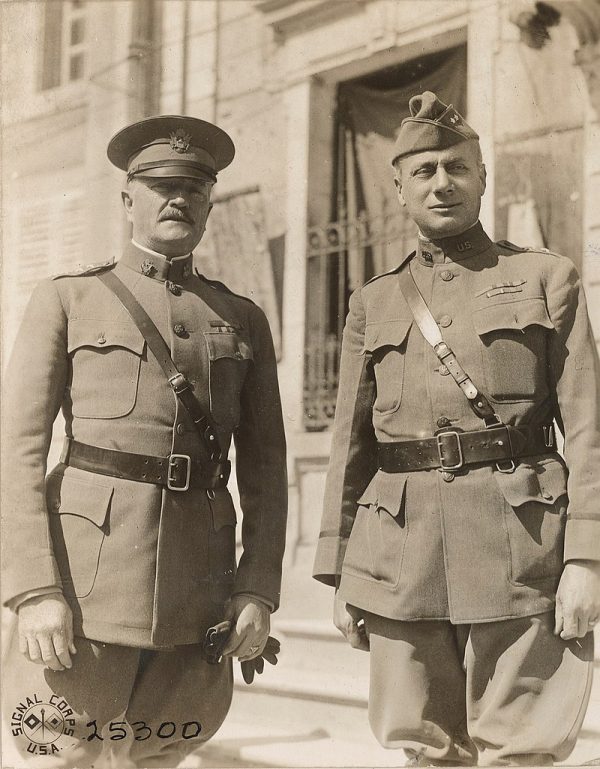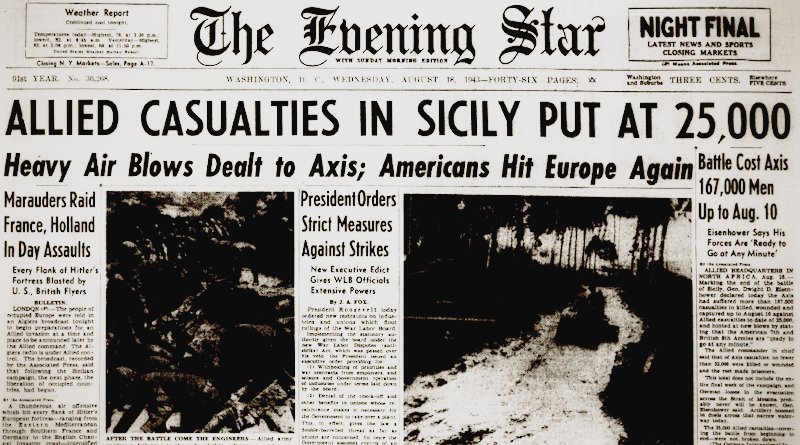World War II Chronicle: August 18, 1943
Click here for TODAY’S NEWSPAPER
On page two, 155-mm. “Long Tom” field guns have begun firing on the Italian mainland from positions on Sicily. The Long Tom can hurl rounds 25,000 yards (14 miles) downrange… George Fielding Eliot column on page 10…
Sports on page 15, which mentions that the New York Yankees and Washington Nationals had to share hotel rooms today. The Yankees didn’t catch the train out of town until midnight and no other rooms were available until the team left, so the Nationals players had to share the same space for several hours…
There is a brief mention of the passing of Lt. Gen. William M. Wright on page 19, who was Gen. John J. Pershing’s roommate at West Point. Wright dropped out due to poor grades and took a captain’s commission in the New York National Guard. President Chester Arthur nominated Wright for a second lieutenant’s commission in the 2nd Infantry which was narrowly confirmed by the Senate. Pershing later said that Wright was popular, but struggled in geometry, and his former cadet classmates didn’t feel slighted when Wright became an officer before they earned their commissions.

Wright served in the Philippine-American and Spanish-American wars and was a division and corps commander during World War I. Just hours before the Armistice was signed, Wright ordered his 89th Division to attack Stenay, France, resulting in over 300 casualties. While that sounds like an officer looking for glory, Brig. Gen. Fox Conner later testified that the town was mostly intact and command wanted Stenay to be occupied by the Americans so they could rest. His aide-de-campe was Charles H. Gerhardt, who recently took command of the 29th Infantry Division.
Roving Reporter by Ernie Pyle
SOMEWHERE IN SICILY — Every day at the front produces its quota of freak wounds and hairbreadth escapes. Almost any wounded man has missed death only by a matter of inches. Sometimes a bullet can go clear through a man and not hurt him much, while at other times an infinitesimal fragment of a shell can pick out one tiny vital spot and kill him.
Bullets and fragments do crazy things. Our surgeons picked out more than 200 pieces of shrapnel from one fellow. There was hardly a square inch of him, from head to toe, that wasn’t touched. Yet none of them made a vital hit, and the soldier will live.
I remember one soldier who had a hole in the front of his leg just below the hip. It was about the size of a half dollar. It didn’t look bad at all, yet beneath that little wound the leg bone was shattered and arteries were severed, and the surgeons were working hard to get the arteries closed so he wouldn’t bleed to death.
Another fellow I saw had caught a small shell fragment in the wrist. It had entered at a shallow angle and gone clear up the arm to the elbow, and remained buried there. The skin wasn’t even broken at the elbow, but right over the spot where the fragment stopped was a blister as big as a pigeon egg. The blister had been generated by the terrific heat of that tiny piece of metal.
That’s one thing most people don’t realize — that fragments from bursting shells are white hot. I remember an impressive example that happened on our ship during an air raid just before we left Africa. A heavy bomb hit about 100 yards away. Among the many fragments that hit our ship was one about half as big as a tennis ball. It first hit a brose water pipe along the ship’s rail, then tore through a steel bulkhead into the radio room, hit a sailor in the shoulder, turned at right angles and went through a radio set, and finally went through one more steel bulkhead before it stopped.
Here in northern Sicily it is all hill fighting, as it was in northern Tunisia, only worse. Getting the wounded out is often a problem. We had one wounded man who had been lowered by ropes over a sheer 75-foot cliff. He said he wasn’t so concerned about his wounds, but the thought that maybe the rope would break gave him the worst scare of his life.
German medical facilities apparently are as good as ours. Medical supply dumps that we captured show that they are well supplied with the finest stuff.
We know that their system for collecting their wounded and burying their dead is good, for it is only after the most sudden and rapid advances on our part that we find their dead unburied.
We have captured several big Italian medical dumps. Our doctors found our surgical instruments far superior to the Italians’, but both the Germans and the Italians have bandages and compressors that are better than ours.
Evening star. (Washington, D.C.), 18 August 1943. Chronicling America: Historic American Newspapers. Lib. of Congress.
https://chroniclingamerica.loc.gov/lccn/sn83045462/1943-08-18/ed-1/
